Brexit's Impact on the UK and EU Tourism Sector: A Research Report
VerifiedAdded on 2023/04/06
|13
|2734
|182
Report
AI Summary
This report analyzes the impact of Brexit on the tourism sector in the United Kingdom (UK) and European Union (EU). It begins by exploring the historical background of Brexit, including the referendum and the invocation of Article 50, and reviews literature discussing the potential effects on tourism. The report examines tourism trends before and after the Brexit referendum, noting a significant increase in foreign tourism before Brexit and the uncertainty created afterward. It highlights the importance of tourism for job creation and economic contribution in both the UK and EU, and discusses the potential risks, such as increased prices and unfavorable agreements, which could make the UK less attractive to tourists. Despite initial concerns, the report acknowledges a boost in tourism due to the devaluation of the British currency. The research employs an interpretivism method with a qualitative approach, using literature review and content data analysis to assess the impact of Brexit on the tourism industry, emphasizing the need for a Tourism Action Plan to support and strengthen the sector.
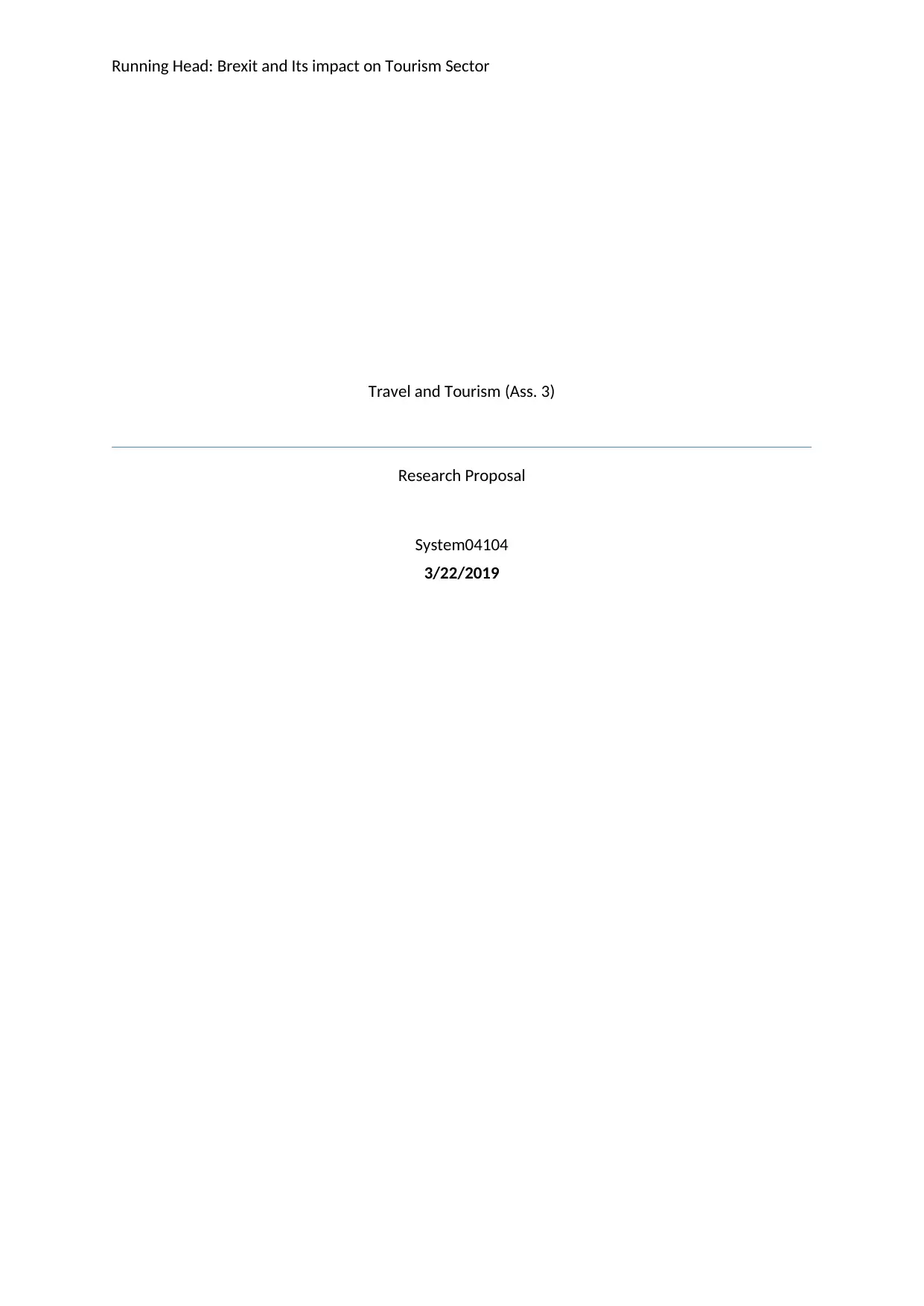
Running Head: Brexit and Its impact on Tourism Sector
Travel and Tourism (Ass. 3)
Research Proposal
System04104
3/22/2019
Travel and Tourism (Ass. 3)
Research Proposal
System04104
3/22/2019
Paraphrase This Document
Need a fresh take? Get an instant paraphrase of this document with our AI Paraphraser
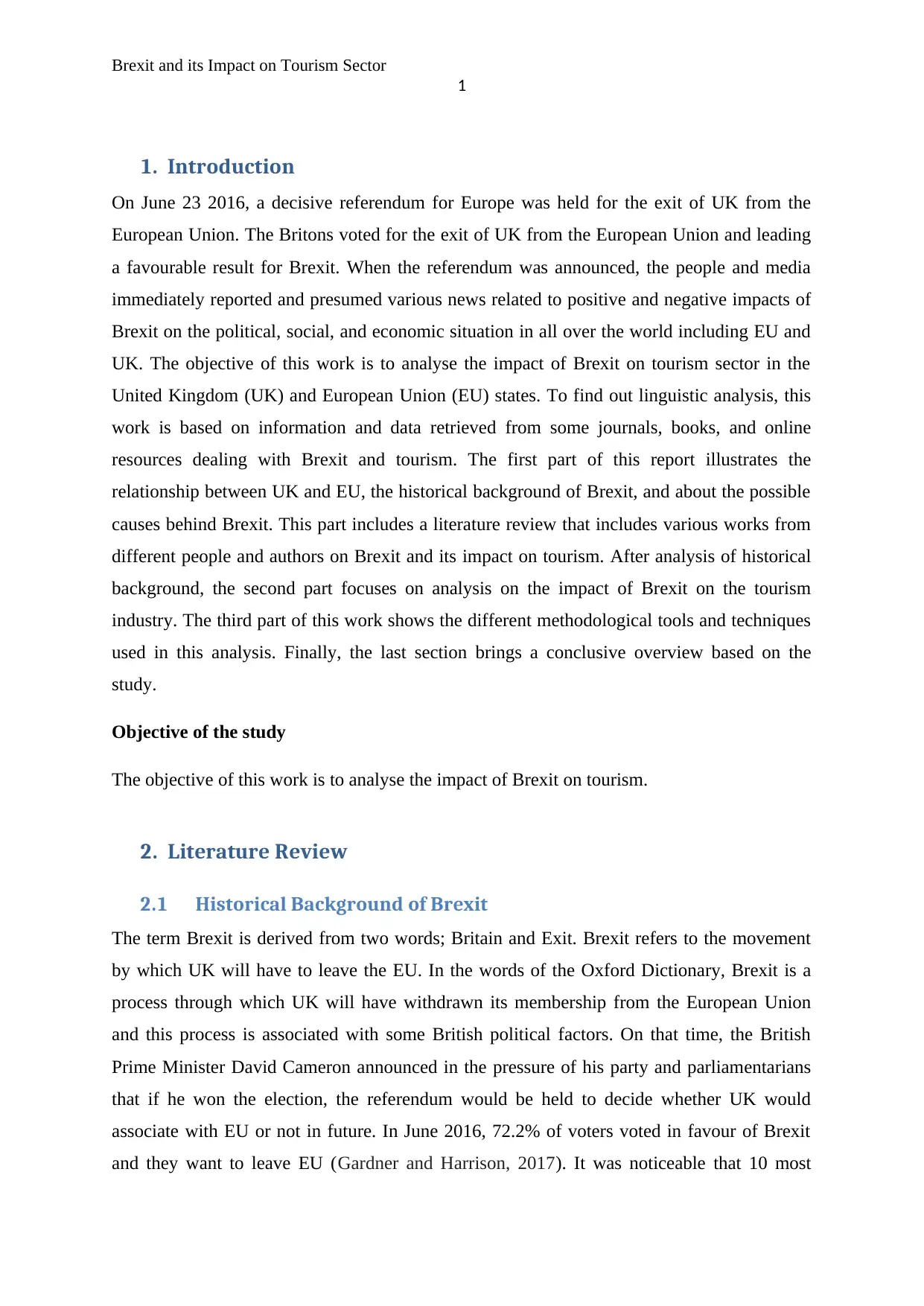
Brexit and its Impact on Tourism Sector
1
1. Introduction
On June 23 2016, a decisive referendum for Europe was held for the exit of UK from the
European Union. The Britons voted for the exit of UK from the European Union and leading
a favourable result for Brexit. When the referendum was announced, the people and media
immediately reported and presumed various news related to positive and negative impacts of
Brexit on the political, social, and economic situation in all over the world including EU and
UK. The objective of this work is to analyse the impact of Brexit on tourism sector in the
United Kingdom (UK) and European Union (EU) states. To find out linguistic analysis, this
work is based on information and data retrieved from some journals, books, and online
resources dealing with Brexit and tourism. The first part of this report illustrates the
relationship between UK and EU, the historical background of Brexit, and about the possible
causes behind Brexit. This part includes a literature review that includes various works from
different people and authors on Brexit and its impact on tourism. After analysis of historical
background, the second part focuses on analysis on the impact of Brexit on the tourism
industry. The third part of this work shows the different methodological tools and techniques
used in this analysis. Finally, the last section brings a conclusive overview based on the
study.
Objective of the study
The objective of this work is to analyse the impact of Brexit on tourism.
2. Literature Review
2.1 Historical Background of Brexit
The term Brexit is derived from two words; Britain and Exit. Brexit refers to the movement
by which UK will have to leave the EU. In the words of the Oxford Dictionary, Brexit is a
process through which UK will have withdrawn its membership from the European Union
and this process is associated with some British political factors. On that time, the British
Prime Minister David Cameron announced in the pressure of his party and parliamentarians
that if he won the election, the referendum would be held to decide whether UK would
associate with EU or not in future. In June 2016, 72.2% of voters voted in favour of Brexit
and they want to leave EU (Gardner and Harrison, 2017). It was noticeable that 10 most
1
1. Introduction
On June 23 2016, a decisive referendum for Europe was held for the exit of UK from the
European Union. The Britons voted for the exit of UK from the European Union and leading
a favourable result for Brexit. When the referendum was announced, the people and media
immediately reported and presumed various news related to positive and negative impacts of
Brexit on the political, social, and economic situation in all over the world including EU and
UK. The objective of this work is to analyse the impact of Brexit on tourism sector in the
United Kingdom (UK) and European Union (EU) states. To find out linguistic analysis, this
work is based on information and data retrieved from some journals, books, and online
resources dealing with Brexit and tourism. The first part of this report illustrates the
relationship between UK and EU, the historical background of Brexit, and about the possible
causes behind Brexit. This part includes a literature review that includes various works from
different people and authors on Brexit and its impact on tourism. After analysis of historical
background, the second part focuses on analysis on the impact of Brexit on the tourism
industry. The third part of this work shows the different methodological tools and techniques
used in this analysis. Finally, the last section brings a conclusive overview based on the
study.
Objective of the study
The objective of this work is to analyse the impact of Brexit on tourism.
2. Literature Review
2.1 Historical Background of Brexit
The term Brexit is derived from two words; Britain and Exit. Brexit refers to the movement
by which UK will have to leave the EU. In the words of the Oxford Dictionary, Brexit is a
process through which UK will have withdrawn its membership from the European Union
and this process is associated with some British political factors. On that time, the British
Prime Minister David Cameron announced in the pressure of his party and parliamentarians
that if he won the election, the referendum would be held to decide whether UK would
associate with EU or not in future. In June 2016, 72.2% of voters voted in favour of Brexit
and they want to leave EU (Gardner and Harrison, 2017). It was noticeable that 10 most
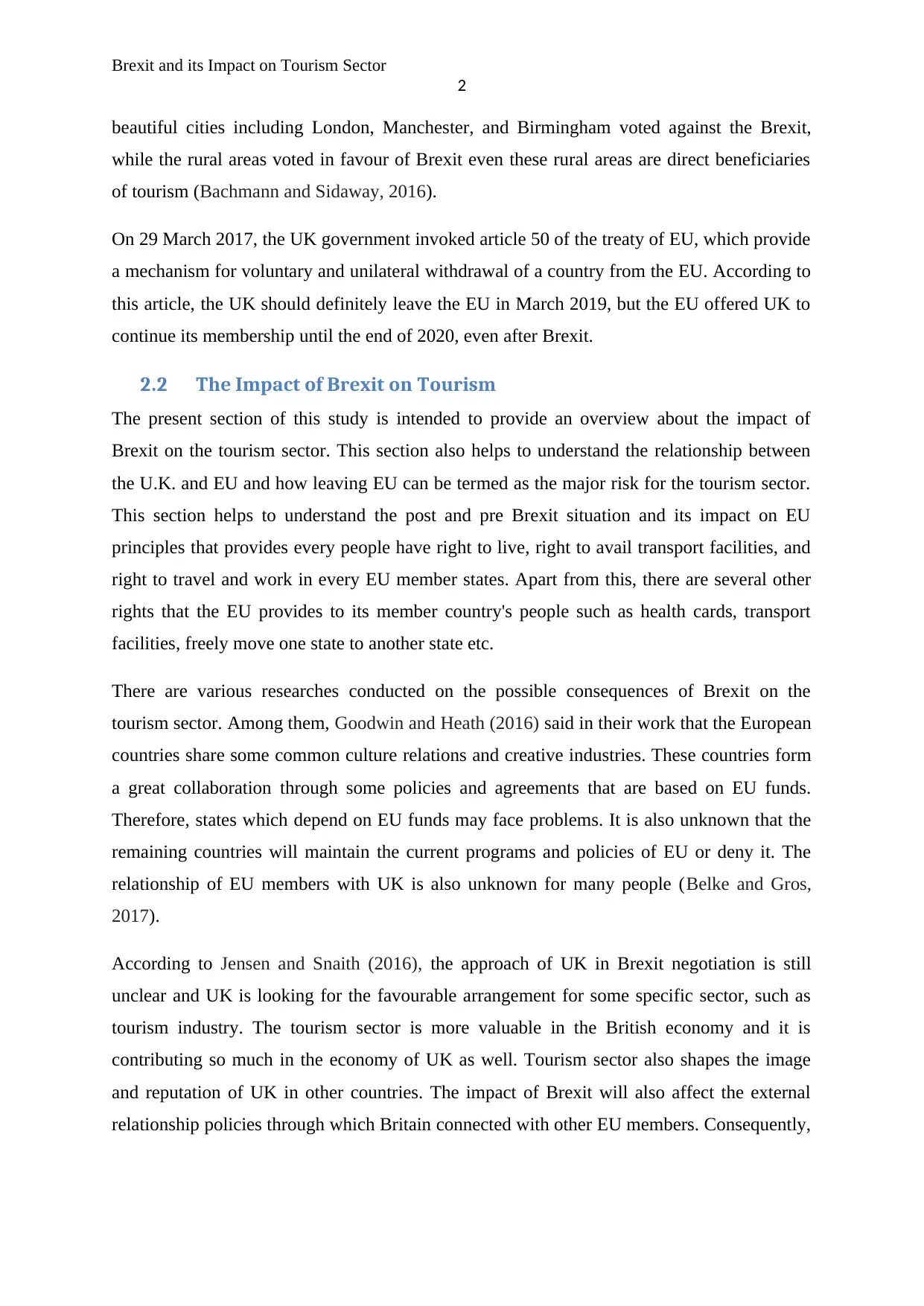
Brexit and its Impact on Tourism Sector
2
beautiful cities including London, Manchester, and Birmingham voted against the Brexit,
while the rural areas voted in favour of Brexit even these rural areas are direct beneficiaries
of tourism (Bachmann and Sidaway, 2016).
On 29 March 2017, the UK government invoked article 50 of the treaty of EU, which provide
a mechanism for voluntary and unilateral withdrawal of a country from the EU. According to
this article, the UK should definitely leave the EU in March 2019, but the EU offered UK to
continue its membership until the end of 2020, even after Brexit.
2.2 The Impact of Brexit on Tourism
The present section of this study is intended to provide an overview about the impact of
Brexit on the tourism sector. This section also helps to understand the relationship between
the U.K. and EU and how leaving EU can be termed as the major risk for the tourism sector.
This section helps to understand the post and pre Brexit situation and its impact on EU
principles that provides every people have right to live, right to avail transport facilities, and
right to travel and work in every EU member states. Apart from this, there are several other
rights that the EU provides to its member country's people such as health cards, transport
facilities, freely move one state to another state etc.
There are various researches conducted on the possible consequences of Brexit on the
tourism sector. Among them, Goodwin and Heath (2016) said in their work that the European
countries share some common culture relations and creative industries. These countries form
a great collaboration through some policies and agreements that are based on EU funds.
Therefore, states which depend on EU funds may face problems. It is also unknown that the
remaining countries will maintain the current programs and policies of EU or deny it. The
relationship of EU members with UK is also unknown for many people (Belke and Gros,
2017).
According to Jensen and Snaith (2016), the approach of UK in Brexit negotiation is still
unclear and UK is looking for the favourable arrangement for some specific sector, such as
tourism industry. The tourism sector is more valuable in the British economy and it is
contributing so much in the economy of UK as well. Tourism sector also shapes the image
and reputation of UK in other countries. The impact of Brexit will also affect the external
relationship policies through which Britain connected with other EU members. Consequently,
2
beautiful cities including London, Manchester, and Birmingham voted against the Brexit,
while the rural areas voted in favour of Brexit even these rural areas are direct beneficiaries
of tourism (Bachmann and Sidaway, 2016).
On 29 March 2017, the UK government invoked article 50 of the treaty of EU, which provide
a mechanism for voluntary and unilateral withdrawal of a country from the EU. According to
this article, the UK should definitely leave the EU in March 2019, but the EU offered UK to
continue its membership until the end of 2020, even after Brexit.
2.2 The Impact of Brexit on Tourism
The present section of this study is intended to provide an overview about the impact of
Brexit on the tourism sector. This section also helps to understand the relationship between
the U.K. and EU and how leaving EU can be termed as the major risk for the tourism sector.
This section helps to understand the post and pre Brexit situation and its impact on EU
principles that provides every people have right to live, right to avail transport facilities, and
right to travel and work in every EU member states. Apart from this, there are several other
rights that the EU provides to its member country's people such as health cards, transport
facilities, freely move one state to another state etc.
There are various researches conducted on the possible consequences of Brexit on the
tourism sector. Among them, Goodwin and Heath (2016) said in their work that the European
countries share some common culture relations and creative industries. These countries form
a great collaboration through some policies and agreements that are based on EU funds.
Therefore, states which depend on EU funds may face problems. It is also unknown that the
remaining countries will maintain the current programs and policies of EU or deny it. The
relationship of EU members with UK is also unknown for many people (Belke and Gros,
2017).
According to Jensen and Snaith (2016), the approach of UK in Brexit negotiation is still
unclear and UK is looking for the favourable arrangement for some specific sector, such as
tourism industry. The tourism sector is more valuable in the British economy and it is
contributing so much in the economy of UK as well. Tourism sector also shapes the image
and reputation of UK in other countries. The impact of Brexit will also affect the external
relationship policies through which Britain connected with other EU members. Consequently,
⊘ This is a preview!⊘
Do you want full access?
Subscribe today to unlock all pages.

Trusted by 1+ million students worldwide
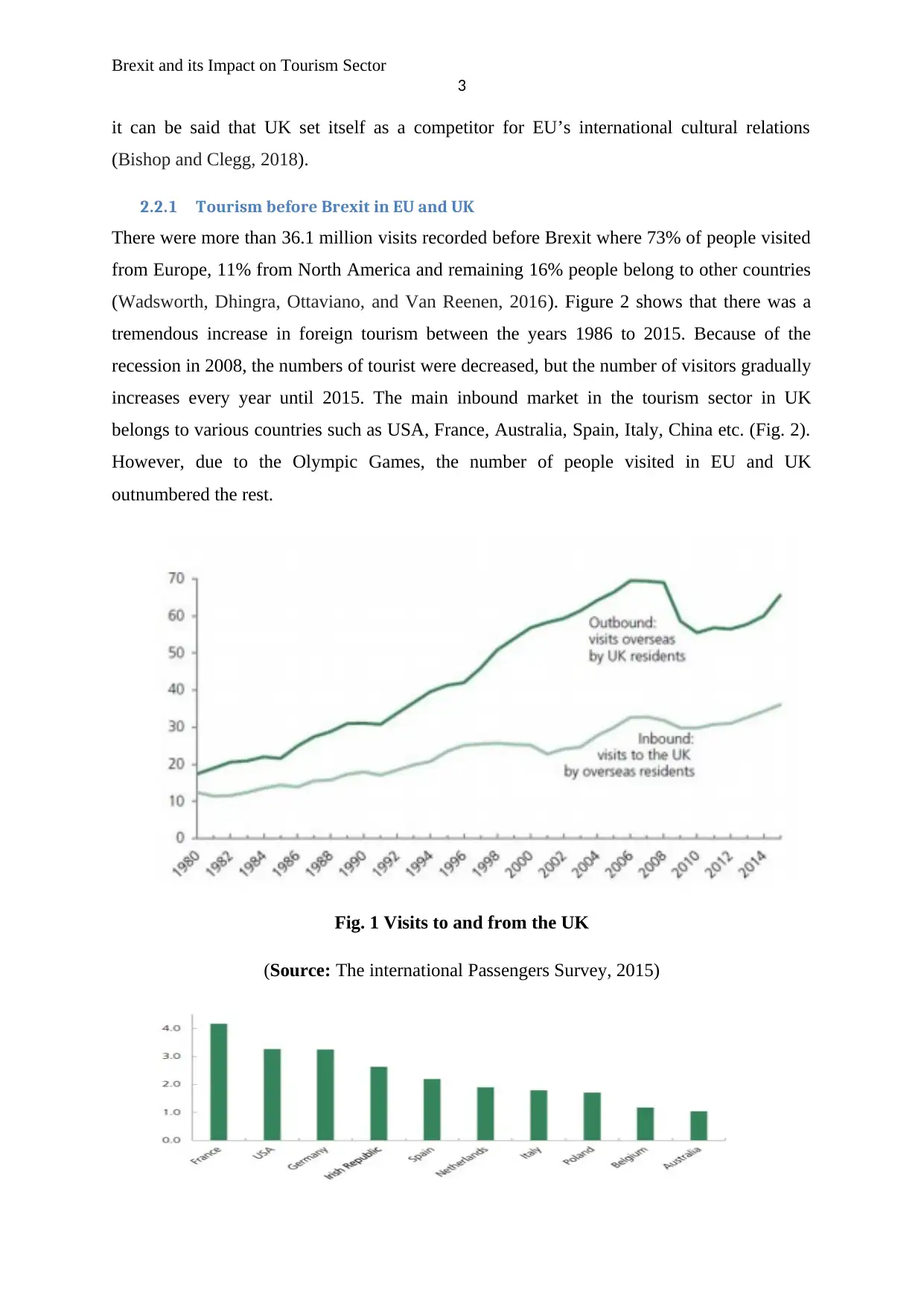
Brexit and its Impact on Tourism Sector
3
it can be said that UK set itself as a competitor for EU’s international cultural relations
(Bishop and Clegg, 2018).
2.2.1 Tourism before Brexit in EU and UK
There were more than 36.1 million visits recorded before Brexit where 73% of people visited
from Europe, 11% from North America and remaining 16% people belong to other countries
(Wadsworth, Dhingra, Ottaviano, and Van Reenen, 2016). Figure 2 shows that there was a
tremendous increase in foreign tourism between the years 1986 to 2015. Because of the
recession in 2008, the numbers of tourist were decreased, but the number of visitors gradually
increases every year until 2015. The main inbound market in the tourism sector in UK
belongs to various countries such as USA, France, Australia, Spain, Italy, China etc. (Fig. 2).
However, due to the Olympic Games, the number of people visited in EU and UK
outnumbered the rest.
Fig. 1 Visits to and from the UK
(Source: The international Passengers Survey, 2015)
3
it can be said that UK set itself as a competitor for EU’s international cultural relations
(Bishop and Clegg, 2018).
2.2.1 Tourism before Brexit in EU and UK
There were more than 36.1 million visits recorded before Brexit where 73% of people visited
from Europe, 11% from North America and remaining 16% people belong to other countries
(Wadsworth, Dhingra, Ottaviano, and Van Reenen, 2016). Figure 2 shows that there was a
tremendous increase in foreign tourism between the years 1986 to 2015. Because of the
recession in 2008, the numbers of tourist were decreased, but the number of visitors gradually
increases every year until 2015. The main inbound market in the tourism sector in UK
belongs to various countries such as USA, France, Australia, Spain, Italy, China etc. (Fig. 2).
However, due to the Olympic Games, the number of people visited in EU and UK
outnumbered the rest.
Fig. 1 Visits to and from the UK
(Source: The international Passengers Survey, 2015)
Paraphrase This Document
Need a fresh take? Get an instant paraphrase of this document with our AI Paraphraser
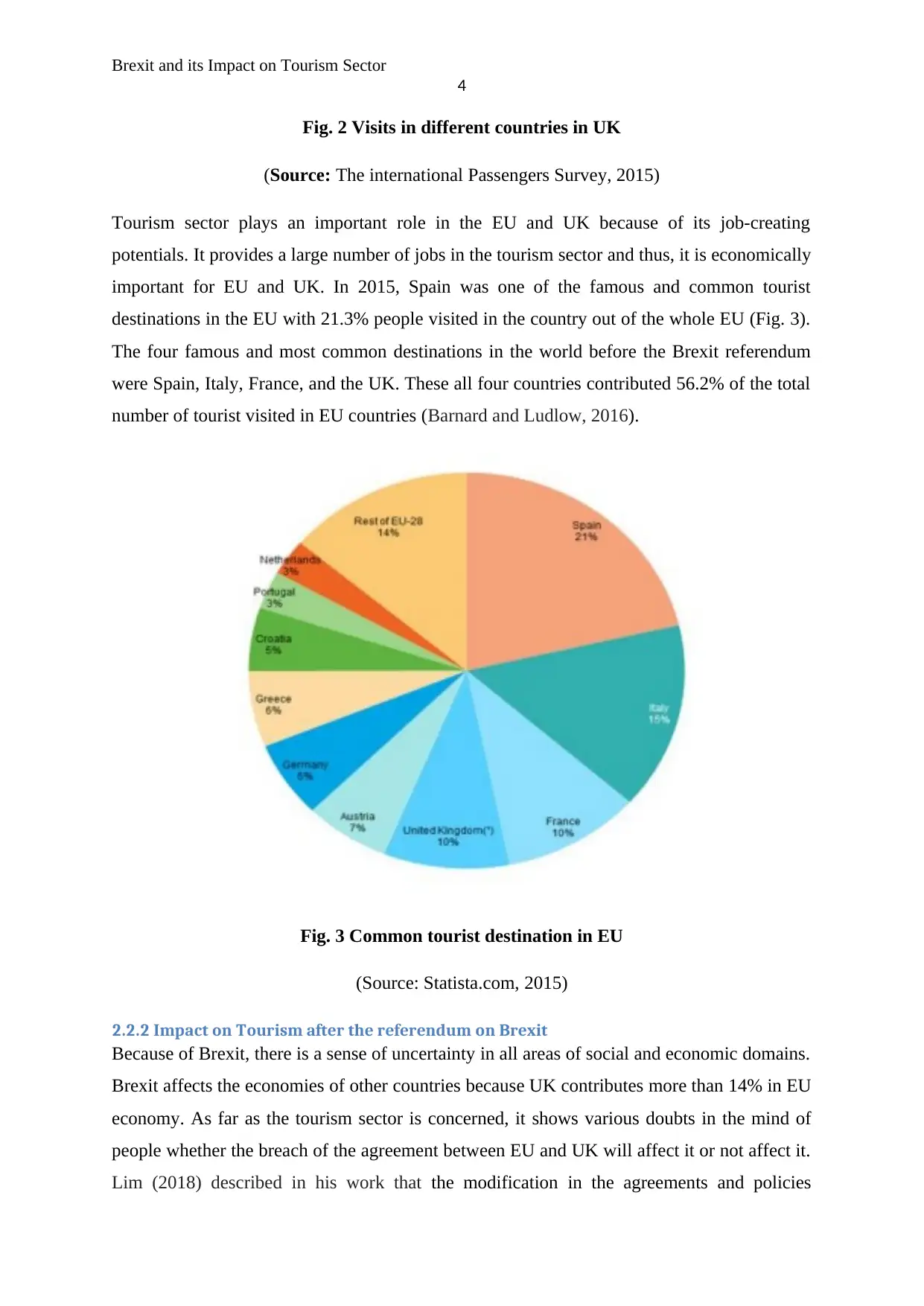
Brexit and its Impact on Tourism Sector
4
Fig. 2 Visits in different countries in UK
(Source: The international Passengers Survey, 2015)
Tourism sector plays an important role in the EU and UK because of its job-creating
potentials. It provides a large number of jobs in the tourism sector and thus, it is economically
important for EU and UK. In 2015, Spain was one of the famous and common tourist
destinations in the EU with 21.3% people visited in the country out of the whole EU (Fig. 3).
The four famous and most common destinations in the world before the Brexit referendum
were Spain, Italy, France, and the UK. These all four countries contributed 56.2% of the total
number of tourist visited in EU countries (Barnard and Ludlow, 2016).
Fig. 3 Common tourist destination in EU
(Source: Statista.com, 2015)
2.2.2 Impact on Tourism after the referendum on Brexit
Because of Brexit, there is a sense of uncertainty in all areas of social and economic domains.
Brexit affects the economies of other countries because UK contributes more than 14% in EU
economy. As far as the tourism sector is concerned, it shows various doubts in the mind of
people whether the breach of the agreement between EU and UK will affect it or not affect it.
Lim (2018) described in his work that the modification in the agreements and policies
4
Fig. 2 Visits in different countries in UK
(Source: The international Passengers Survey, 2015)
Tourism sector plays an important role in the EU and UK because of its job-creating
potentials. It provides a large number of jobs in the tourism sector and thus, it is economically
important for EU and UK. In 2015, Spain was one of the famous and common tourist
destinations in the EU with 21.3% people visited in the country out of the whole EU (Fig. 3).
The four famous and most common destinations in the world before the Brexit referendum
were Spain, Italy, France, and the UK. These all four countries contributed 56.2% of the total
number of tourist visited in EU countries (Barnard and Ludlow, 2016).
Fig. 3 Common tourist destination in EU
(Source: Statista.com, 2015)
2.2.2 Impact on Tourism after the referendum on Brexit
Because of Brexit, there is a sense of uncertainty in all areas of social and economic domains.
Brexit affects the economies of other countries because UK contributes more than 14% in EU
economy. As far as the tourism sector is concerned, it shows various doubts in the mind of
people whether the breach of the agreement between EU and UK will affect it or not affect it.
Lim (2018) described in his work that the modification in the agreements and policies
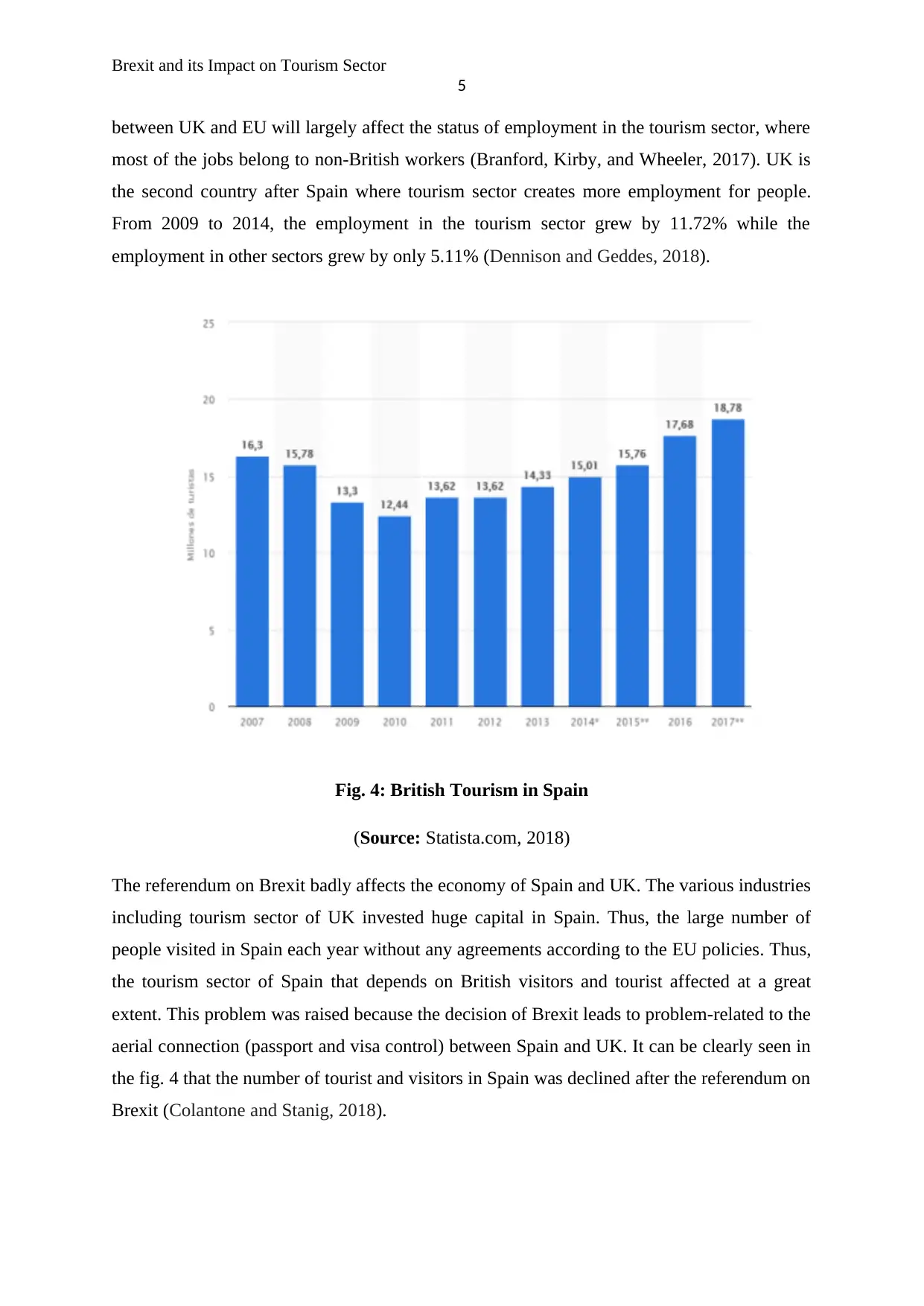
Brexit and its Impact on Tourism Sector
5
between UK and EU will largely affect the status of employment in the tourism sector, where
most of the jobs belong to non-British workers (Branford, Kirby, and Wheeler, 2017). UK is
the second country after Spain where tourism sector creates more employment for people.
From 2009 to 2014, the employment in the tourism sector grew by 11.72% while the
employment in other sectors grew by only 5.11% (Dennison and Geddes, 2018).
Fig. 4: British Tourism in Spain
(Source: Statista.com, 2018)
The referendum on Brexit badly affects the economy of Spain and UK. The various industries
including tourism sector of UK invested huge capital in Spain. Thus, the large number of
people visited in Spain each year without any agreements according to the EU policies. Thus,
the tourism sector of Spain that depends on British visitors and tourist affected at a great
extent. This problem was raised because the decision of Brexit leads to problem-related to the
aerial connection (passport and visa control) between Spain and UK. It can be clearly seen in
the fig. 4 that the number of tourist and visitors in Spain was declined after the referendum on
Brexit (Colantone and Stanig, 2018).
5
between UK and EU will largely affect the status of employment in the tourism sector, where
most of the jobs belong to non-British workers (Branford, Kirby, and Wheeler, 2017). UK is
the second country after Spain where tourism sector creates more employment for people.
From 2009 to 2014, the employment in the tourism sector grew by 11.72% while the
employment in other sectors grew by only 5.11% (Dennison and Geddes, 2018).
Fig. 4: British Tourism in Spain
(Source: Statista.com, 2018)
The referendum on Brexit badly affects the economy of Spain and UK. The various industries
including tourism sector of UK invested huge capital in Spain. Thus, the large number of
people visited in Spain each year without any agreements according to the EU policies. Thus,
the tourism sector of Spain that depends on British visitors and tourist affected at a great
extent. This problem was raised because the decision of Brexit leads to problem-related to the
aerial connection (passport and visa control) between Spain and UK. It can be clearly seen in
the fig. 4 that the number of tourist and visitors in Spain was declined after the referendum on
Brexit (Colantone and Stanig, 2018).
⊘ This is a preview!⊘
Do you want full access?
Subscribe today to unlock all pages.

Trusted by 1+ million students worldwide
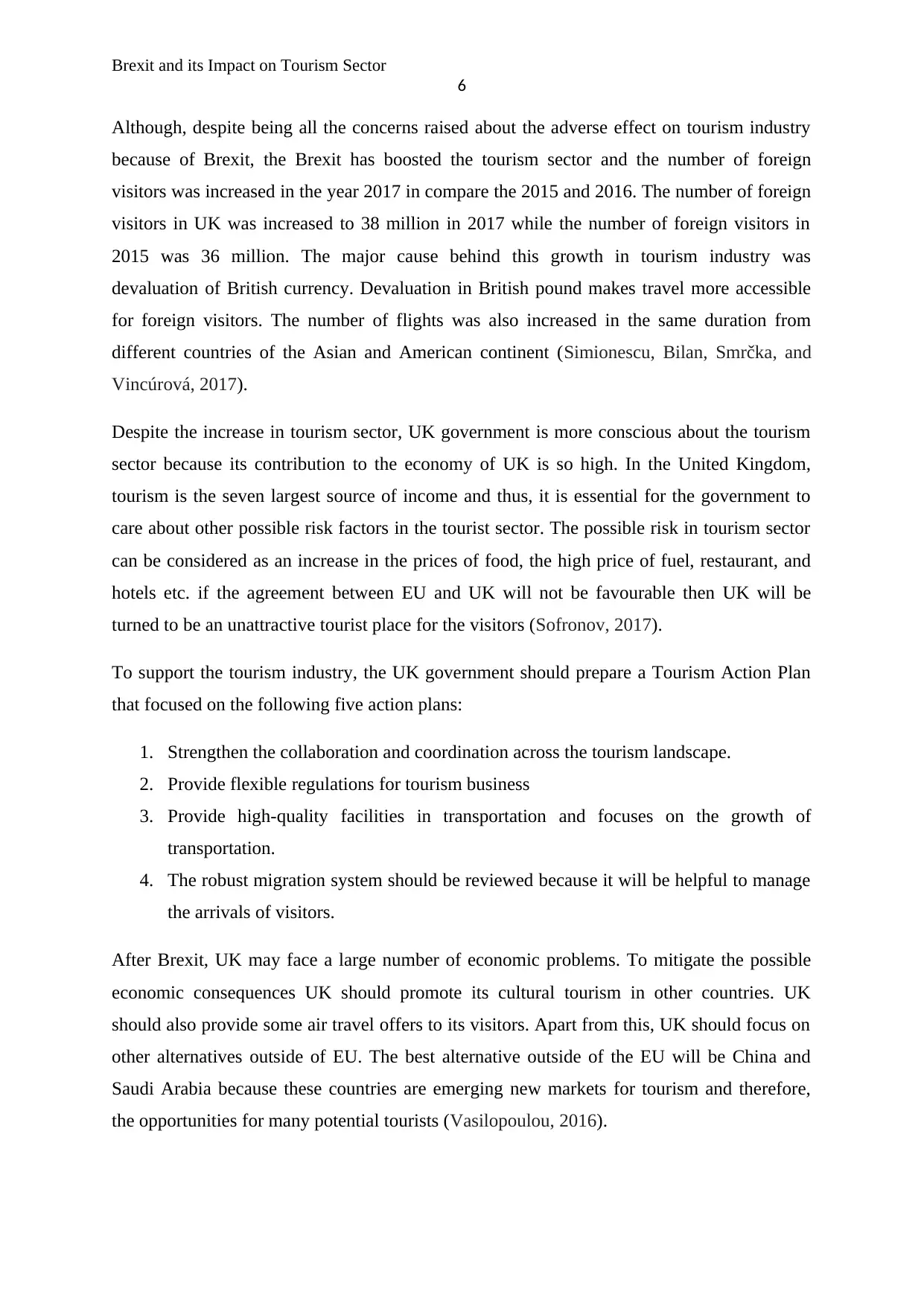
Brexit and its Impact on Tourism Sector
6
Although, despite being all the concerns raised about the adverse effect on tourism industry
because of Brexit, the Brexit has boosted the tourism sector and the number of foreign
visitors was increased in the year 2017 in compare the 2015 and 2016. The number of foreign
visitors in UK was increased to 38 million in 2017 while the number of foreign visitors in
2015 was 36 million. The major cause behind this growth in tourism industry was
devaluation of British currency. Devaluation in British pound makes travel more accessible
for foreign visitors. The number of flights was also increased in the same duration from
different countries of the Asian and American continent (Simionescu, Bilan, Smrčka, and
Vincúrová, 2017).
Despite the increase in tourism sector, UK government is more conscious about the tourism
sector because its contribution to the economy of UK is so high. In the United Kingdom,
tourism is the seven largest source of income and thus, it is essential for the government to
care about other possible risk factors in the tourist sector. The possible risk in tourism sector
can be considered as an increase in the prices of food, the high price of fuel, restaurant, and
hotels etc. if the agreement between EU and UK will not be favourable then UK will be
turned to be an unattractive tourist place for the visitors (Sofronov, 2017).
To support the tourism industry, the UK government should prepare a Tourism Action Plan
that focused on the following five action plans:
1. Strengthen the collaboration and coordination across the tourism landscape.
2. Provide flexible regulations for tourism business
3. Provide high-quality facilities in transportation and focuses on the growth of
transportation.
4. The robust migration system should be reviewed because it will be helpful to manage
the arrivals of visitors.
After Brexit, UK may face a large number of economic problems. To mitigate the possible
economic consequences UK should promote its cultural tourism in other countries. UK
should also provide some air travel offers to its visitors. Apart from this, UK should focus on
other alternatives outside of EU. The best alternative outside of the EU will be China and
Saudi Arabia because these countries are emerging new markets for tourism and therefore,
the opportunities for many potential tourists (Vasilopoulou, 2016).
6
Although, despite being all the concerns raised about the adverse effect on tourism industry
because of Brexit, the Brexit has boosted the tourism sector and the number of foreign
visitors was increased in the year 2017 in compare the 2015 and 2016. The number of foreign
visitors in UK was increased to 38 million in 2017 while the number of foreign visitors in
2015 was 36 million. The major cause behind this growth in tourism industry was
devaluation of British currency. Devaluation in British pound makes travel more accessible
for foreign visitors. The number of flights was also increased in the same duration from
different countries of the Asian and American continent (Simionescu, Bilan, Smrčka, and
Vincúrová, 2017).
Despite the increase in tourism sector, UK government is more conscious about the tourism
sector because its contribution to the economy of UK is so high. In the United Kingdom,
tourism is the seven largest source of income and thus, it is essential for the government to
care about other possible risk factors in the tourist sector. The possible risk in tourism sector
can be considered as an increase in the prices of food, the high price of fuel, restaurant, and
hotels etc. if the agreement between EU and UK will not be favourable then UK will be
turned to be an unattractive tourist place for the visitors (Sofronov, 2017).
To support the tourism industry, the UK government should prepare a Tourism Action Plan
that focused on the following five action plans:
1. Strengthen the collaboration and coordination across the tourism landscape.
2. Provide flexible regulations for tourism business
3. Provide high-quality facilities in transportation and focuses on the growth of
transportation.
4. The robust migration system should be reviewed because it will be helpful to manage
the arrivals of visitors.
After Brexit, UK may face a large number of economic problems. To mitigate the possible
economic consequences UK should promote its cultural tourism in other countries. UK
should also provide some air travel offers to its visitors. Apart from this, UK should focus on
other alternatives outside of EU. The best alternative outside of the EU will be China and
Saudi Arabia because these countries are emerging new markets for tourism and therefore,
the opportunities for many potential tourists (Vasilopoulou, 2016).
Paraphrase This Document
Need a fresh take? Get an instant paraphrase of this document with our AI Paraphraser
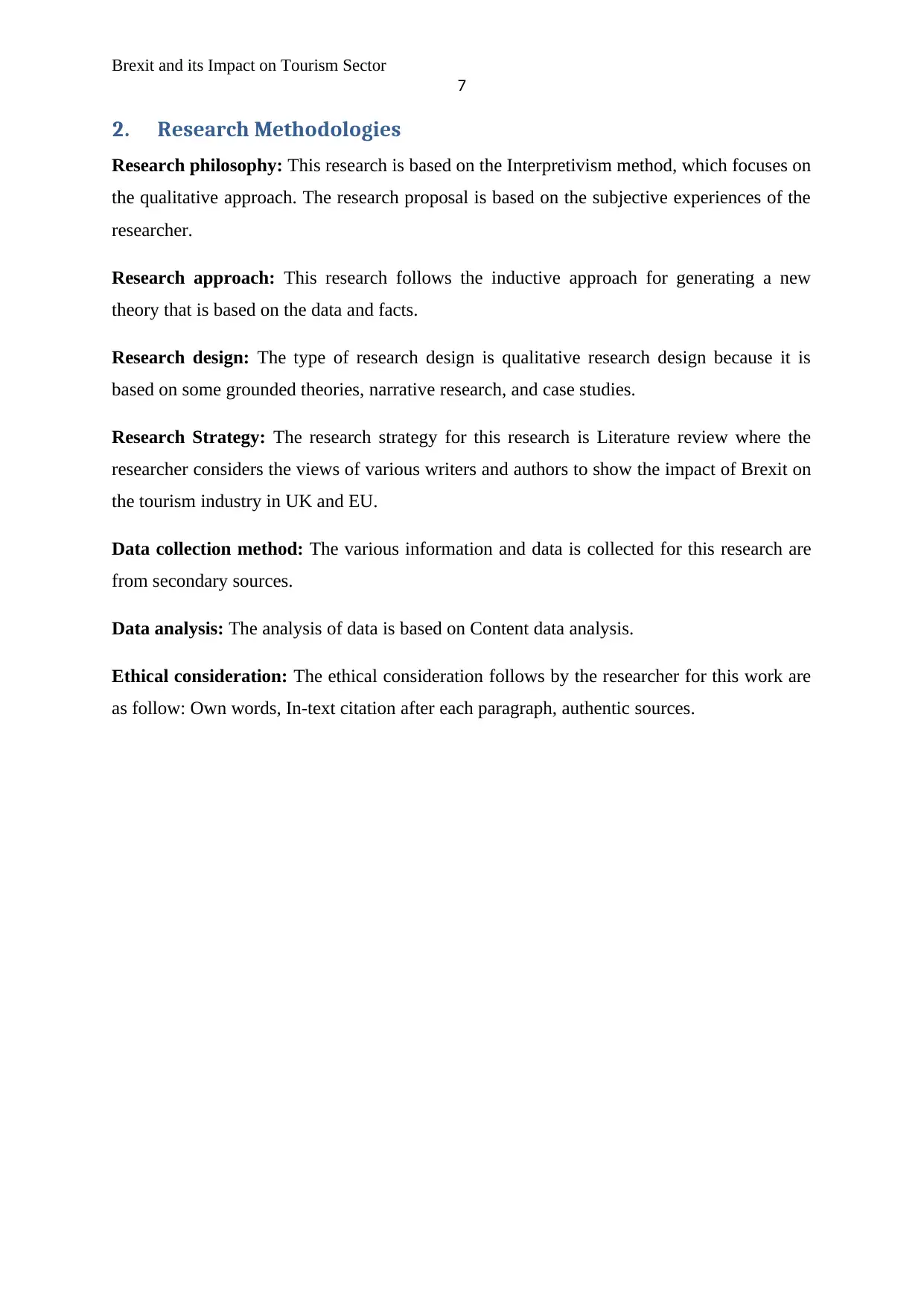
Brexit and its Impact on Tourism Sector
7
2. Research Methodologies
Research philosophy: This research is based on the Interpretivism method, which focuses on
the qualitative approach. The research proposal is based on the subjective experiences of the
researcher.
Research approach: This research follows the inductive approach for generating a new
theory that is based on the data and facts.
Research design: The type of research design is qualitative research design because it is
based on some grounded theories, narrative research, and case studies.
Research Strategy: The research strategy for this research is Literature review where the
researcher considers the views of various writers and authors to show the impact of Brexit on
the tourism industry in UK and EU.
Data collection method: The various information and data is collected for this research are
from secondary sources.
Data analysis: The analysis of data is based on Content data analysis.
Ethical consideration: The ethical consideration follows by the researcher for this work are
as follow: Own words, In-text citation after each paragraph, authentic sources.
7
2. Research Methodologies
Research philosophy: This research is based on the Interpretivism method, which focuses on
the qualitative approach. The research proposal is based on the subjective experiences of the
researcher.
Research approach: This research follows the inductive approach for generating a new
theory that is based on the data and facts.
Research design: The type of research design is qualitative research design because it is
based on some grounded theories, narrative research, and case studies.
Research Strategy: The research strategy for this research is Literature review where the
researcher considers the views of various writers and authors to show the impact of Brexit on
the tourism industry in UK and EU.
Data collection method: The various information and data is collected for this research are
from secondary sources.
Data analysis: The analysis of data is based on Content data analysis.
Ethical consideration: The ethical consideration follows by the researcher for this work are
as follow: Own words, In-text citation after each paragraph, authentic sources.
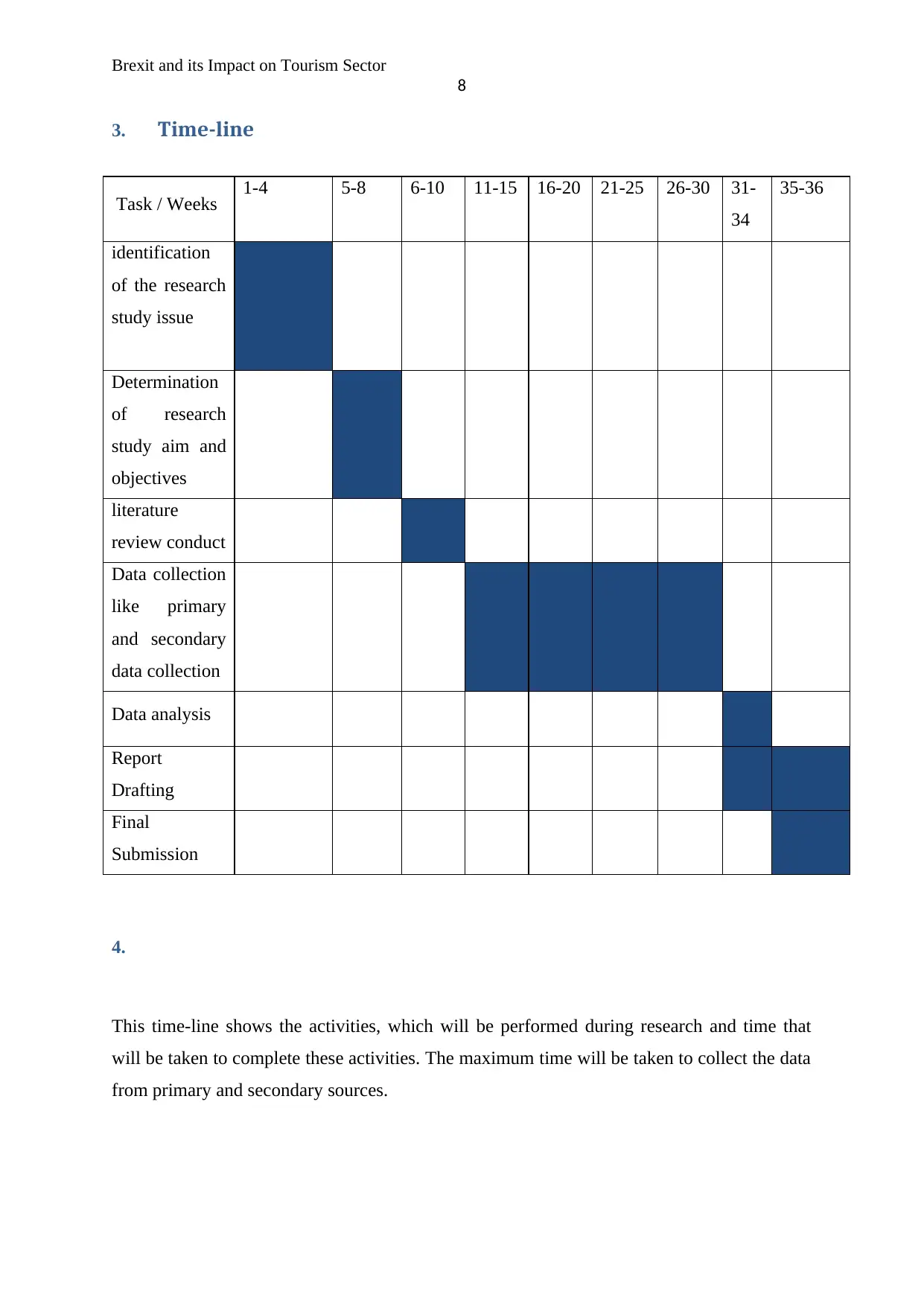
Brexit and its Impact on Tourism Sector
8
3. Time-line
4.
This time-line shows the activities, which will be performed during research and time that
will be taken to complete these activities. The maximum time will be taken to collect the data
from primary and secondary sources.
Task / Weeks 1-4 5-8 6-10 11-15 16-20 21-25 26-30 31-
34
35-36
identification
of the research
study issue
Determination
of research
study aim and
objectives
literature
review conduct
Data collection
like primary
and secondary
data collection
Data analysis
Report
Drafting
Final
Submission
8
3. Time-line
4.
This time-line shows the activities, which will be performed during research and time that
will be taken to complete these activities. The maximum time will be taken to collect the data
from primary and secondary sources.
Task / Weeks 1-4 5-8 6-10 11-15 16-20 21-25 26-30 31-
34
35-36
identification
of the research
study issue
Determination
of research
study aim and
objectives
literature
review conduct
Data collection
like primary
and secondary
data collection
Data analysis
Report
Drafting
Final
Submission
⊘ This is a preview!⊘
Do you want full access?
Subscribe today to unlock all pages.

Trusted by 1+ million students worldwide

Brexit and its Impact on Tourism Sector
9
9
Paraphrase This Document
Need a fresh take? Get an instant paraphrase of this document with our AI Paraphraser
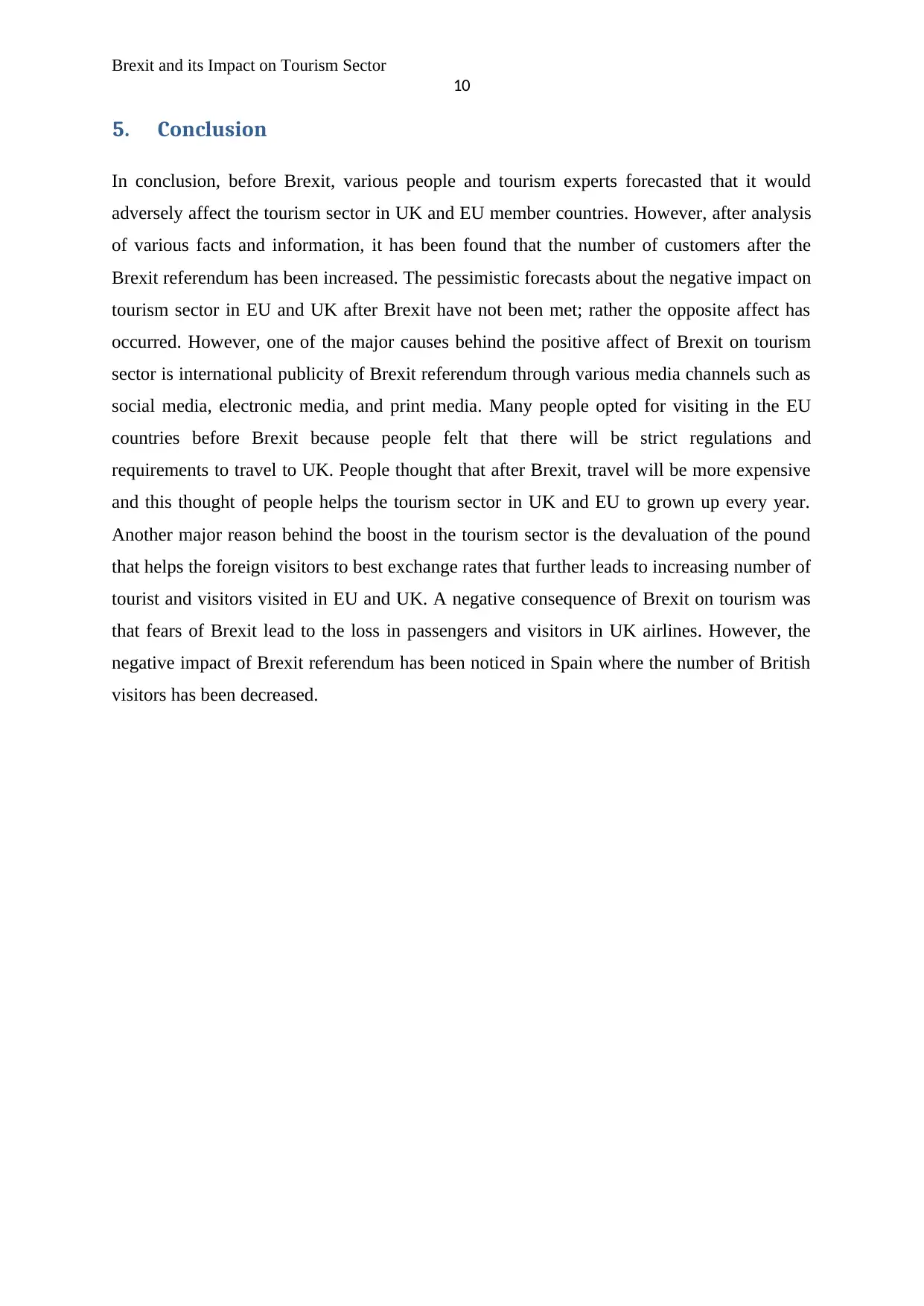
Brexit and its Impact on Tourism Sector
10
5. Conclusion
In conclusion, before Brexit, various people and tourism experts forecasted that it would
adversely affect the tourism sector in UK and EU member countries. However, after analysis
of various facts and information, it has been found that the number of customers after the
Brexit referendum has been increased. The pessimistic forecasts about the negative impact on
tourism sector in EU and UK after Brexit have not been met; rather the opposite affect has
occurred. However, one of the major causes behind the positive affect of Brexit on tourism
sector is international publicity of Brexit referendum through various media channels such as
social media, electronic media, and print media. Many people opted for visiting in the EU
countries before Brexit because people felt that there will be strict regulations and
requirements to travel to UK. People thought that after Brexit, travel will be more expensive
and this thought of people helps the tourism sector in UK and EU to grown up every year.
Another major reason behind the boost in the tourism sector is the devaluation of the pound
that helps the foreign visitors to best exchange rates that further leads to increasing number of
tourist and visitors visited in EU and UK. A negative consequence of Brexit on tourism was
that fears of Brexit lead to the loss in passengers and visitors in UK airlines. However, the
negative impact of Brexit referendum has been noticed in Spain where the number of British
visitors has been decreased.
10
5. Conclusion
In conclusion, before Brexit, various people and tourism experts forecasted that it would
adversely affect the tourism sector in UK and EU member countries. However, after analysis
of various facts and information, it has been found that the number of customers after the
Brexit referendum has been increased. The pessimistic forecasts about the negative impact on
tourism sector in EU and UK after Brexit have not been met; rather the opposite affect has
occurred. However, one of the major causes behind the positive affect of Brexit on tourism
sector is international publicity of Brexit referendum through various media channels such as
social media, electronic media, and print media. Many people opted for visiting in the EU
countries before Brexit because people felt that there will be strict regulations and
requirements to travel to UK. People thought that after Brexit, travel will be more expensive
and this thought of people helps the tourism sector in UK and EU to grown up every year.
Another major reason behind the boost in the tourism sector is the devaluation of the pound
that helps the foreign visitors to best exchange rates that further leads to increasing number of
tourist and visitors visited in EU and UK. A negative consequence of Brexit on tourism was
that fears of Brexit lead to the loss in passengers and visitors in UK airlines. However, the
negative impact of Brexit referendum has been noticed in Spain where the number of British
visitors has been decreased.
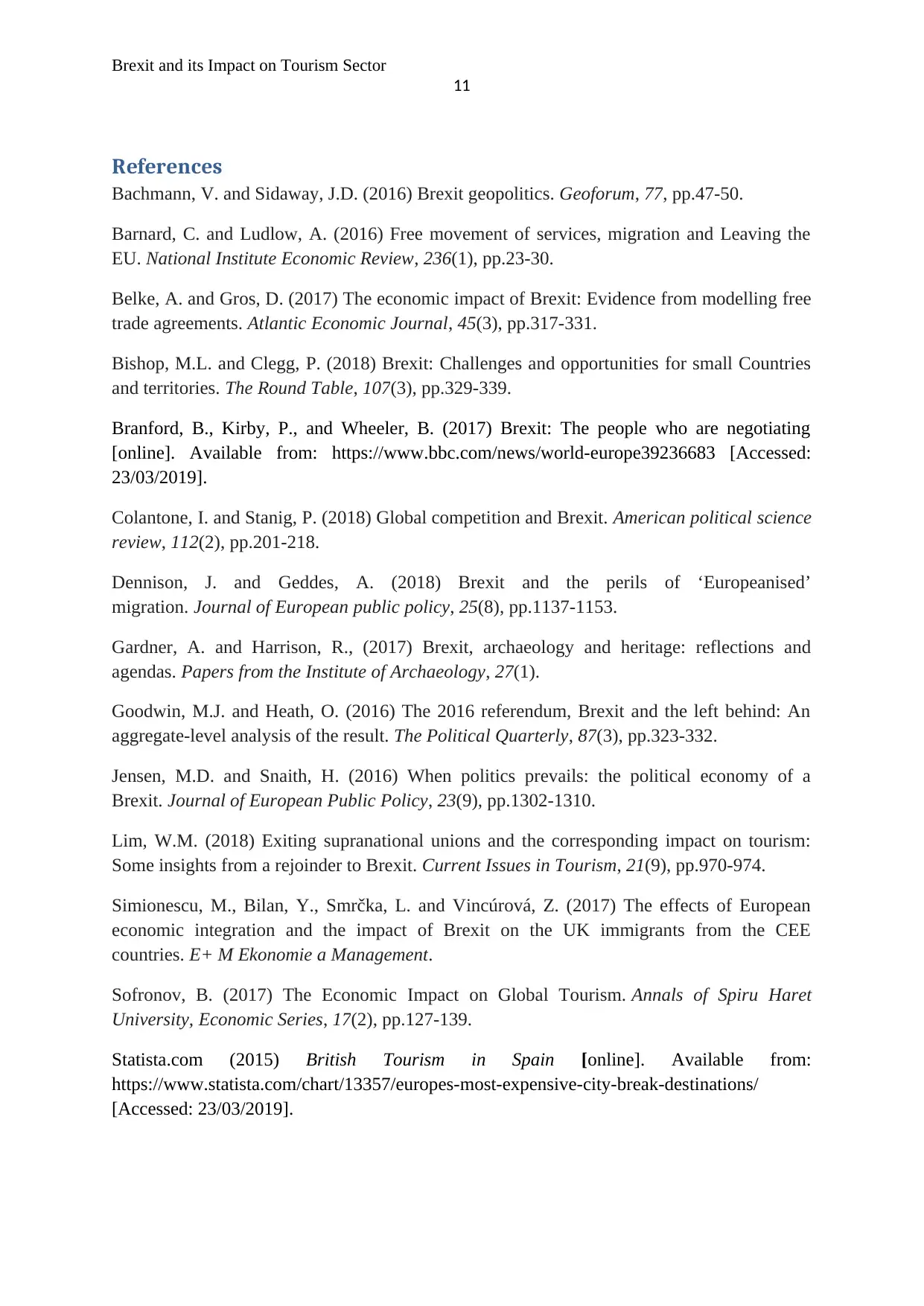
Brexit and its Impact on Tourism Sector
11
References
Bachmann, V. and Sidaway, J.D. (2016) Brexit geopolitics. Geoforum, 77, pp.47-50.
Barnard, C. and Ludlow, A. (2016) Free movement of services, migration and Leaving the
EU. National Institute Economic Review, 236(1), pp.23-30.
Belke, A. and Gros, D. (2017) The economic impact of Brexit: Evidence from modelling free
trade agreements. Atlantic Economic Journal, 45(3), pp.317-331.
Bishop, M.L. and Clegg, P. (2018) Brexit: Challenges and opportunities for small Countries
and territories. The Round Table, 107(3), pp.329-339.
Branford, B., Kirby, P., and Wheeler, B. (2017) Brexit: The people who are negotiating
[online]. Available from: https://www.bbc.com/news/world-europe39236683 [Accessed:
23/03/2019].
Colantone, I. and Stanig, P. (2018) Global competition and Brexit. American political science
review, 112(2), pp.201-218.
Dennison, J. and Geddes, A. (2018) Brexit and the perils of ‘Europeanised’
migration. Journal of European public policy, 25(8), pp.1137-1153.
Gardner, A. and Harrison, R., (2017) Brexit, archaeology and heritage: reflections and
agendas. Papers from the Institute of Archaeology, 27(1).
Goodwin, M.J. and Heath, O. (2016) The 2016 referendum, Brexit and the left behind: An
aggregate‐level analysis of the result. The Political Quarterly, 87(3), pp.323-332.
Jensen, M.D. and Snaith, H. (2016) When politics prevails: the political economy of a
Brexit. Journal of European Public Policy, 23(9), pp.1302-1310.
Lim, W.M. (2018) Exiting supranational unions and the corresponding impact on tourism:
Some insights from a rejoinder to Brexit. Current Issues in Tourism, 21(9), pp.970-974.
Simionescu, M., Bilan, Y., Smrčka, L. and Vincúrová, Z. (2017) The effects of European
economic integration and the impact of Brexit on the UK immigrants from the CEE
countries. E+ M Ekonomie a Management.
Sofronov, B. (2017) The Economic Impact on Global Tourism. Annals of Spiru Haret
University, Economic Series, 17(2), pp.127-139.
Statista.com (2015) British Tourism in Spain [online]. Available from:
https://www.statista.com/chart/13357/europes-most-expensive-city-break-destinations/
[Accessed: 23/03/2019].
11
References
Bachmann, V. and Sidaway, J.D. (2016) Brexit geopolitics. Geoforum, 77, pp.47-50.
Barnard, C. and Ludlow, A. (2016) Free movement of services, migration and Leaving the
EU. National Institute Economic Review, 236(1), pp.23-30.
Belke, A. and Gros, D. (2017) The economic impact of Brexit: Evidence from modelling free
trade agreements. Atlantic Economic Journal, 45(3), pp.317-331.
Bishop, M.L. and Clegg, P. (2018) Brexit: Challenges and opportunities for small Countries
and territories. The Round Table, 107(3), pp.329-339.
Branford, B., Kirby, P., and Wheeler, B. (2017) Brexit: The people who are negotiating
[online]. Available from: https://www.bbc.com/news/world-europe39236683 [Accessed:
23/03/2019].
Colantone, I. and Stanig, P. (2018) Global competition and Brexit. American political science
review, 112(2), pp.201-218.
Dennison, J. and Geddes, A. (2018) Brexit and the perils of ‘Europeanised’
migration. Journal of European public policy, 25(8), pp.1137-1153.
Gardner, A. and Harrison, R., (2017) Brexit, archaeology and heritage: reflections and
agendas. Papers from the Institute of Archaeology, 27(1).
Goodwin, M.J. and Heath, O. (2016) The 2016 referendum, Brexit and the left behind: An
aggregate‐level analysis of the result. The Political Quarterly, 87(3), pp.323-332.
Jensen, M.D. and Snaith, H. (2016) When politics prevails: the political economy of a
Brexit. Journal of European Public Policy, 23(9), pp.1302-1310.
Lim, W.M. (2018) Exiting supranational unions and the corresponding impact on tourism:
Some insights from a rejoinder to Brexit. Current Issues in Tourism, 21(9), pp.970-974.
Simionescu, M., Bilan, Y., Smrčka, L. and Vincúrová, Z. (2017) The effects of European
economic integration and the impact of Brexit on the UK immigrants from the CEE
countries. E+ M Ekonomie a Management.
Sofronov, B. (2017) The Economic Impact on Global Tourism. Annals of Spiru Haret
University, Economic Series, 17(2), pp.127-139.
Statista.com (2015) British Tourism in Spain [online]. Available from:
https://www.statista.com/chart/13357/europes-most-expensive-city-break-destinations/
[Accessed: 23/03/2019].
⊘ This is a preview!⊘
Do you want full access?
Subscribe today to unlock all pages.

Trusted by 1+ million students worldwide
1 out of 13
Related Documents
Your All-in-One AI-Powered Toolkit for Academic Success.
+13062052269
info@desklib.com
Available 24*7 on WhatsApp / Email
![[object Object]](/_next/static/media/star-bottom.7253800d.svg)
Unlock your academic potential
Copyright © 2020–2026 A2Z Services. All Rights Reserved. Developed and managed by ZUCOL.




